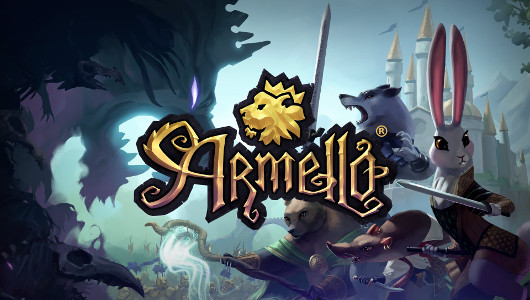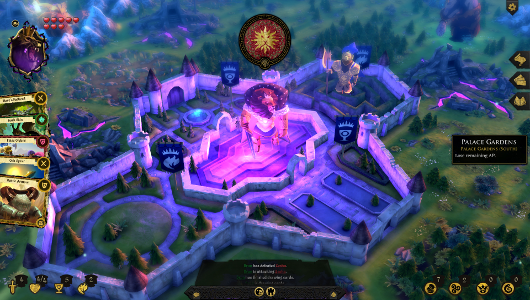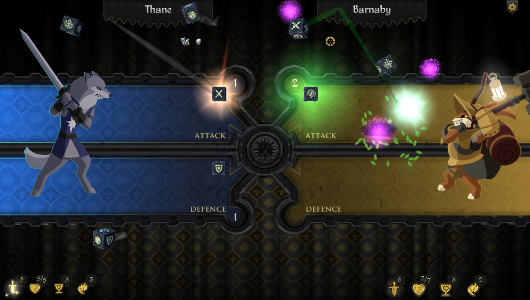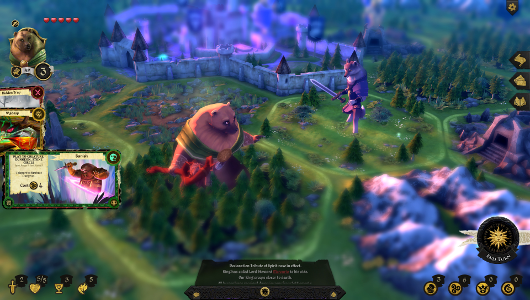Strategy games are few and far between on console these days. They’re deep and rewarding experiences normally played out over multiple hours of play, honing the perfect strategies to use against both A.I. and human opponents. Choosing to outright crush your enemies with aggressive tactics or play conservatively and sneak in and win the game right at the end. But what happens when you attempt to blend tabletop games with strategy video games? Armello is the answer.
• Developer: League of Geeks
• Publisher: League of Geeks
• Reviewed on: PlayStation 4
• Also Available On: PC, iOS, Android
• Release Date: Available Now
The premise of Armello is simple; the once righteous king has become corrupt and is tearing the kingdom apart – through no will of his own. A corruption known as “the rot” is slowly pushing him further into madness and is slowly killing him in the process.
In order to save the kingdom, eight heroes from four different clans rise to stake their claim for the throne. You choose one character – each who have different traits and skills – and attempt to win the game through four different methods. These methods include outright killing the king in his palace at the centre of the game map, using the rot to corrupt yourself more than the king, banishing the king through the use of spirit stones or by playing the political game and usurping the throne once the king dies – as he loses health as the game progresses.
Armello is unfortunately not the easiest of games to get to grips with. There are four tutorials explaining the mechanics, but there are a lot to get your head around. Questing, perils, prestige, dice, burning cards, body, wits, magic, fight, claiming settlements, the king’s guard, declarations, followers, items, spells, trickery, the rot, combat and much more, these are some of the terms you’ll be bombarded with in the tutorial. The game throws masses of information and stats at you in such a small space of time that it was hard to remember what to do once an actual game had started. Even for a strategy game, Armello is overly complex and borderline frustrating when jumping in for the first time.
You gain items and spells to equip through cards which you draw at the beginning of each turn and each card has a specific type which allows you to burn it in combat to increase your odds in victory – more on that in a minute.
Gameplay occurs on a grid based game map where each tile has different properties. Forest tiles will stealth your character, stone circles will heal you, dungeons will yield rewards and swamps will harm you. Other players and even the king can set perils on tiles to hinder and even kill other opponents. Quests involve a player moving to a specific tile and rolling dice in order to complete the quest and gain rewards. However, this is where Armello can become frustrating. Completing quests, prevailing in combat and overcoming perils all depends on luck and if you have a good assortment of cards in your hand which you can burn. An encounter relies on you rolling dice to match symbols or rolling enough attack and defence to defeat an enemy. Burning cards in your hand can increase your odds of success by removing specific symbols that you need to roll. It’s completely random and based on luck and if you don’t roll the dice you need to the game punishes you for it by removing some cards from your hand, death or other circumstances. Failing multiple encounters in a row forced me to stop playing numerous times.
But on the occasions where luck is on your side, the game becomes almost too easy. Some games can be finished in as little as 15 minutes and the only option you have once completing the game is to jump straight back in again. There’s very little variety and replayability to Armello, every game feels samey and it eventually becomes boring. It doesn’t feel rewarding when you finish a game, there’s no real sense of accomplishment. I didn’t feel like I outright “won” any of my games, luck just always seemed to be on my side.
On the upside, the aesthetic of Armello is gorgeous. The game looks great as it uses a vibrant art style and a diverse colour pallet to really stand out. There’s a unique world with interesting characters and back story which are just begging to be explored.
Armello suffers from the problem of style over substance. It definitely brings some interesting concepts to the table, but it doesn’t feel refined. It’s overly complex and becomes boring after you know what you’re doing. Strategy games should be deep and rewarding experiences and Armello simply doesn’t provide that, it isn’t a bad game by any means, but will certainly turn off players unfamiliar with its gameplay.










